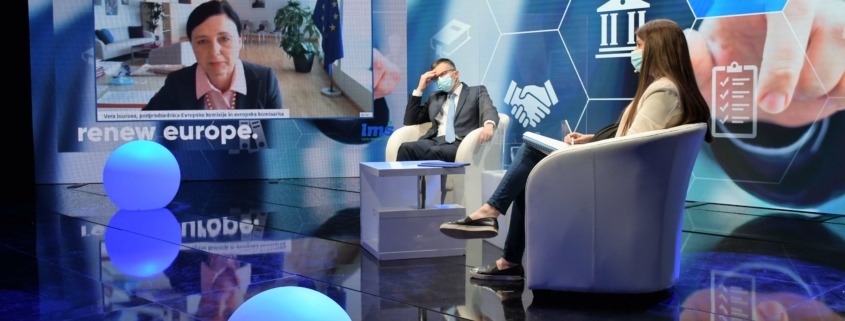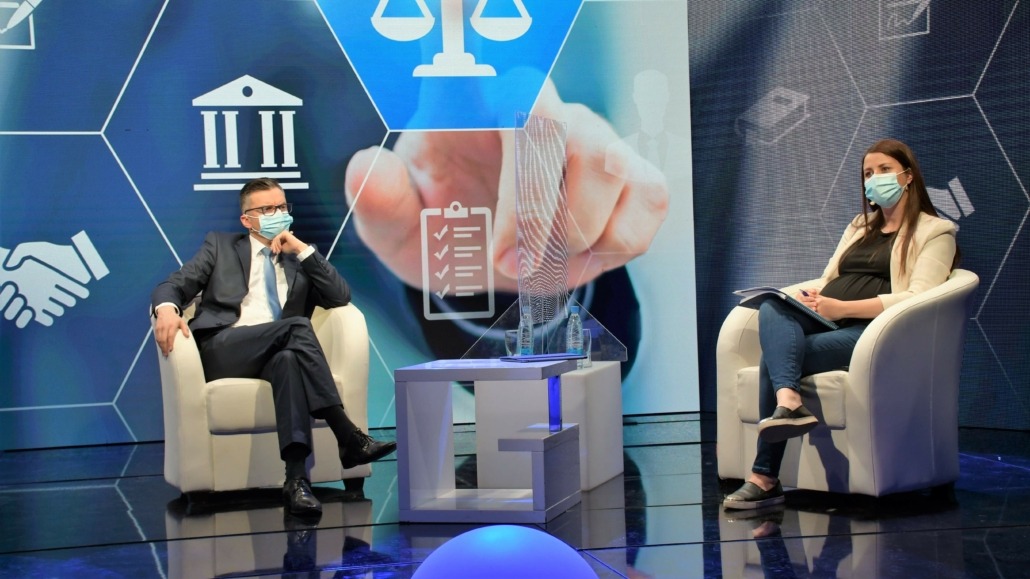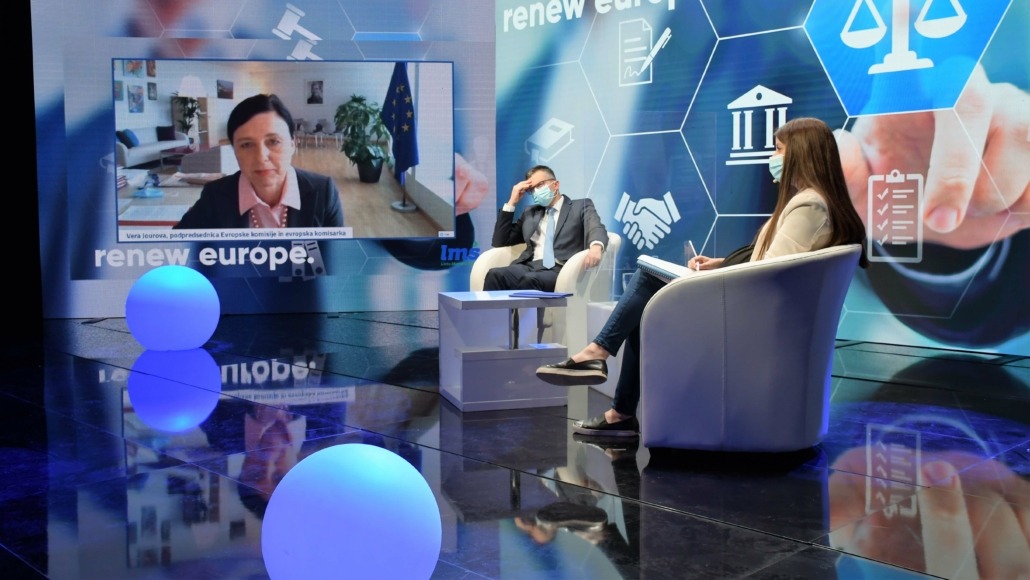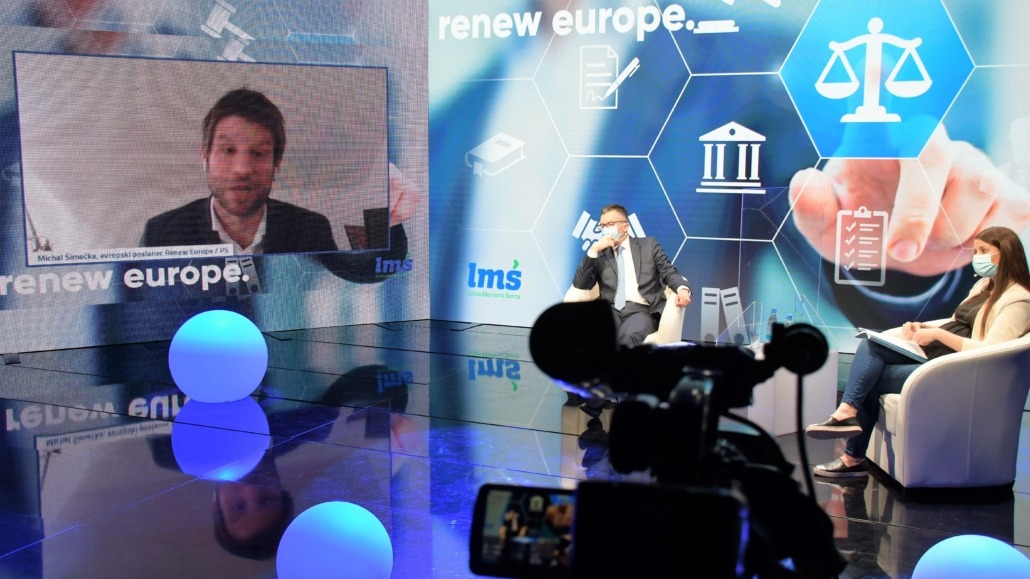On Thursday, April 15, 2021, MEP Irena Joveva hosted a round table on the topic “Rule of Law mechanism, media and situation in Slovenia: RoLLER COASTERS INSTEAD OF ROLE MODELS”.
The discussion was divided into two parts. In the first part, the interlocutors of MEP Irena Joveva were; the Vice-President of the European Commission and Commissioner for Values and Transparency, Vera Jourova, the Slovak MEP Michal Šimečka, and the Professor of European Law, Alberto Alemanno. They discussed the broader picture of Europe, sought answers to issues concerning the rule of law mechanism, and, on this basis, discussed violating countries and the alarming situation in the media. The debaters of the second part were; the president of LMŠ (List of Marjan Šarec) and former prime minister of Slovenia Marjan Šarec, deputy director of the International Press Institute (IPI) Scott Griffen, professor of journalism and media policies Marko Milosavljević, and lawyer and media law specialist Jasna Zakonjšek. Together with Irena Joveva they searched for and replayed scenarios of possible solutions regarding the current situation in Slovenia.
European Commissioner Vera Jourova expressed concern about the decline of fundamental European values. She sees the mechanism of the rule of law as a tool that will fulfil its task. She explained that the Commission was speeding up the preparation of guidelines for the application of the discussed mechanism, as they did not want the possible initiation of the mechanism to to fail to withstand the judgement of the European Court of Justice. The concept of the state governed by the rule of law is not limited to the functioning of the jurisdiction but covers broader aspects of a democratic society, such as the fight against corruption, the protection of human rights, and the freedom and pluralism of the media. “The report on the rule of law in Slovenia covers several positive aspects, such as a good anti-corruption system. However, the Commission expressed concern about the freedom of the media, some attacks on journalists, and especially the events related to the financing of the Slovenian Press Agency (STA).” she summed up the situation in Slovenia, adding that they were monitoring the pressure on the media exercised by the capital, as well as by politics, and added the following: “All member states must recognize the role of the media as one of the pillars of democracy. Instead of making their work difficult, they should be provided with better working conditions.” She commented on the recent offensive tweets of the Slovenian Prime Minister, Janez Janša, who had labelled her as a supporter of the red star as follows: “I am always pleased to respond to an invitation to discussions where opinions meet, and where I can explain the work of the Commission. Values will not defend themselves, and it is our job to do so. I am always prepared to talk and cooperate, with all cards on the table, even when I am invited by someone else.”
Among other things, MEP Irena Joveva pointed out it is important to mention that the rule of law mechanism is not intended against certain countries, but is applied to all based on objective criteria. However, it is also true that in some member states there are several breaches of the rule of law: “The question of the rule of law is neither a national policy nor an ideology.”
MEP Michal Šimečka emphasized that the situation in the field was getting worse: “Those who do not want the rule of law work much faster than we who are trying to stop them with our tools. The precautionary approach is simply not appropriate. If we allow undemocratic regimes to be established in one or more member states, it will be the beginning of the end for the EU. For the EU to work, we must have the same policies and the trust in the notion that all member states are democracies.” He added that it is difficult to protect the freedom of the media if the rule of law mechanism cannot be used: “It is very important whether a national media is independent, whether the government is discriminating against minorities or not, whether it tolerates hate speech or not. We can see that in Poland and Hungary going hand in hand. The President of the European Commission said that the Commission is looking for ways to protect the media; so I am waiting for that to happen, and, finally also for financial support for independent media at all levels. The best thing we can do for journalism is to buy a good local newspaper.”
Professor Alberto Alemanno was also harsh on the European Commission, saying he was overly cautious about losing the case before the European Court of Justice: “The Commission does not use all its powers to enforce the rule of law. I see the problem in the fact that the Commission does not have sufficient political support, but at the same time, it could rely on civil society and non-governmental organizations. Stakeholders in the economy, who could become much more political, could also play their part.”
“Rule of law is the basic postulate of the European Union, and Slovenia has never had any problems with that. Until the current government,” said the president of the LMŠ, Marjan Šarec. “I have been attacked since I joined the presidential company, and for journalists, such an attitude towards them is a shock. The purpose of this shock is to scare them away and get them to quit. Exhaustion of the Slovenian Press Agency is like the siege of a city that you exhaust and starve until it subsides. Journalists should not show fear. There is not that much extremism, but it is loud. We have to act self-protectively and get involved when there are elections.”
“It is hard to say that Slovenia is a copy of Hungary, but we see the same ways in which it tries to discredit journalists, also by politics. They are insulted as being traitors, enemies of national values, and the big problem is that people will start looking at them as targets,” said IPI spokesperson Scott Griffen. As public institutions are closely tied to public funding, it is easier for governments to undermine them; that is why it is important to fight for the existence of independent public media and agencies. Journalists are under constant attacks from leading political positions, which is affecting their work. Therefore, an atmosphere of a coalition of democratic institutions in a democratic society needs to be established, he stated.
Lawyer Jasna Zakonjšek explained that harsh criticism was allowed regarding the journalists’ work, however, the moment criticism shifts to the private sphere, this is no longer something that journalists should suffer. The current government is far from being the only government to which journalists are in the way. Because of the nature of their work, they are a thorn in the side of each government as they also address unpleasant issues. However, due to social media and direct access to the electoral base, the intensity of the attacks has increased significantly. She emphasized that democracy does not stand and fall only on free journalism, but also on the judicial system and the trust in it. Attention must be paid to all institutions of democracy.
In the discussion, Professor Marko Milosavljević paid a lot of attention to the current prime minister’s vulgar and harmful communication to the public, which is not surprising. However, he pointed out the tendencies of media subordination: “The first step is public television and the Slovenian Press Agency, followed by agreements with private media owners – either to intimidate them, to silence them or to reduce their level of criticism.” In his words, the entire Slovenian critical and democratic public should step up consistently and show its democratic position. “We live in the EU, we live in a democracy, and the days of autocrats are over. This requires determination and the absence of fear. The success of aggressive people is threatened when we are not afraid of them.”









Leave a Reply
Want to join the discussion?Feel free to contribute!